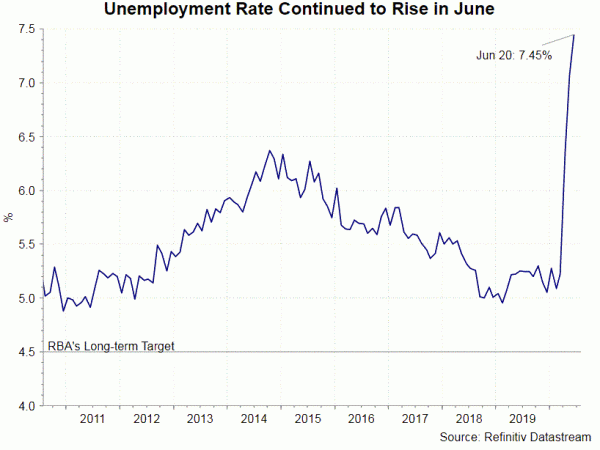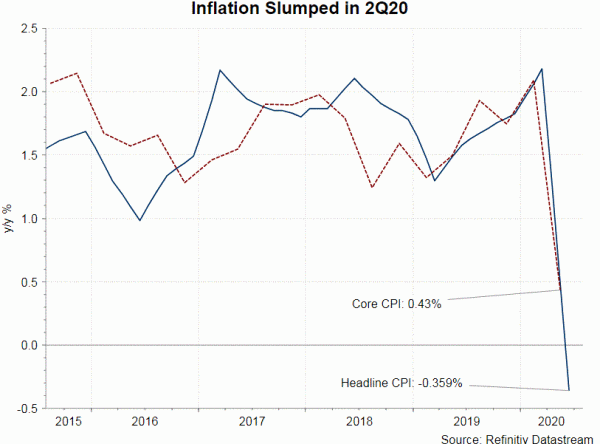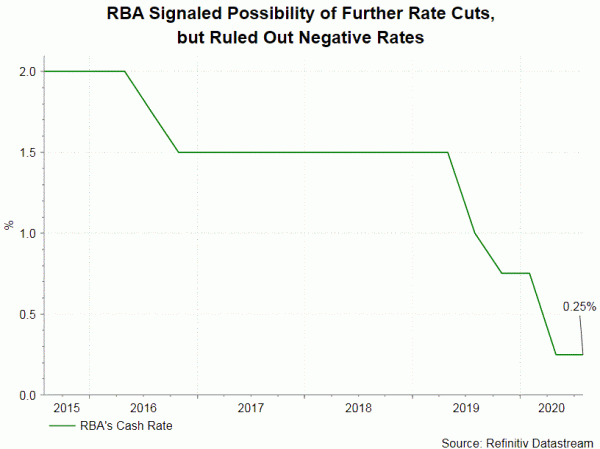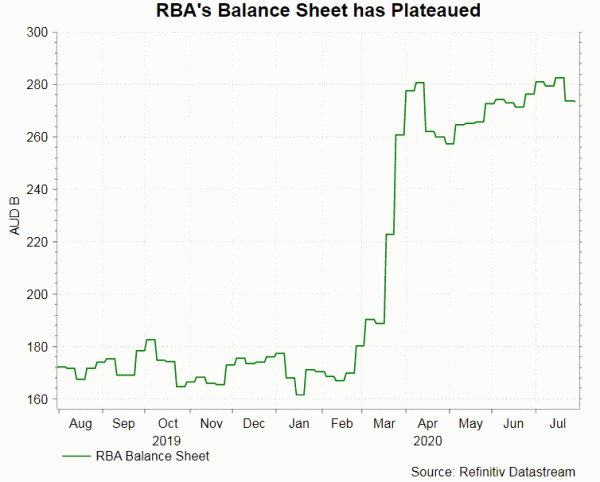RBA will most likely leave all of its monetary policy measures unchanged in August.
The cash rate will stay on hold at 0.25%, the yield curve control program remains targeting 3-year government bonds at 0.25% and the Term Funding Facility will remain in place. However, the officials’ view on the economic outlook in light of the second wave of coronavirus outbreak is of great interest. We expect the members sound slightly more dovish this month, warning of the high uncertainty in the pandemic and the impacts of the renewed restrictive measures on Australia’s economy. While they will reiterate commitment and readiness to add more monetary stimulus if necessary, the policy focus will remain on the fiscal front. We are also interested in the central bank’s view on the recent strength of Aussie, as a result of broad-based recovery in risk appetite and USD weakness.
Economic developments since the June meeting were mixed. The job market showed signs of improvement. The number of employment increased +210.8K in June, after contraction of -227.7K a month ago. The gain exceeded consensus of +112.5K. The unemployment rate climbed +0.3 percentage point to 7.4%. This was driven by higher participation rate, which increased to 64%, from 62.9%. A higher participation rate suggests that more working-age people are returning to the labour force. Inflation dived in 2Q20. Headline CPI plunged -1.9% q/q, compared with +0.3% in 1Q20. From a year ago, the reading dropped -0.3%, after rising +2.2% in the first quarter. RBA’s preferred inflation gauges also showed rapid deceleration in inflation. The weighted median CPI slowed to +1.3% y/y in 2Q20, from +1.7% a quarter ago, while the trimmed mean eased to +1.2% y/y from +1.8% in the first quarter. Other indicators signaled that economic recovery will remain in progress in July. The Markit composite PMI index improved to 57.9 in July from 52.6 in the prior month. Both manufacturing and services sectors improved during the month. Returning to expansion, the manufacturing PMI gained +3.6 points to 53.4. The services PMI accelerated to 58.5 from June’s 53.2.
 However, economic recovery could be derailed by the second wave of coronavirus outbreak. The number of new cases countrywide jumped +3.52K over the past 7 days, compared with +2.53K in the prior week. Victoria has declared a state of disaster and stage 4 restrictions are now in place, including a police-enforced curfew in metro Melbourne. While the majority of new cases are concentrated in Victoria, the trend in other states is also rising. In light of this, we expect the central bank to caution about the resurgence in new cases and the potential derailment to recovery brought about by restrictive measures.
However, economic recovery could be derailed by the second wave of coronavirus outbreak. The number of new cases countrywide jumped +3.52K over the past 7 days, compared with +2.53K in the prior week. Victoria has declared a state of disaster and stage 4 restrictions are now in place, including a police-enforced curfew in metro Melbourne. While the majority of new cases are concentrated in Victoria, the trend in other states is also rising. In light of this, we expect the central bank to caution about the resurgence in new cases and the potential derailment to recovery brought about by restrictive measures.
Despite sending a more dovish message, RBA will keep its powder dry. At a speech two weeks ago, Governor Philip Lowe left the door open for further monetary easing, such as cutting the policy rate further. However, he once again dismissed the possibility of negative interest rates, suggesting that “negative interest rates in Australia are extraordinarily unlikely” as the move can “cause stresses in the financial system that are unhelpful for the supply of credit. They can also encourage people to save more, rather than spend more, so they can be counter-productive from that perspective too”. Lowe also indicated the possibility of altering the configuration of the Term Funding Facility programme. Yet, he suggested that none of these measures are appropriate in the current environment, and “there are limitations to what more can be achieved through monetary policy“. Lowe also ruled our FX intervention. As he suggested, “when the exchange rate is broadly in line with its economic fundamentals, as the Australian dollar is currently, this approach has limited effectiveness. It can also involve substantial financial risks to the public balance sheet and complicate international relationships. So this too is not a direction we need to head in”. Instead, the governor reiterated the important of fiscal support, adding that “in the current environment, there are limitations to what more can be achieved through monetary policy”.

